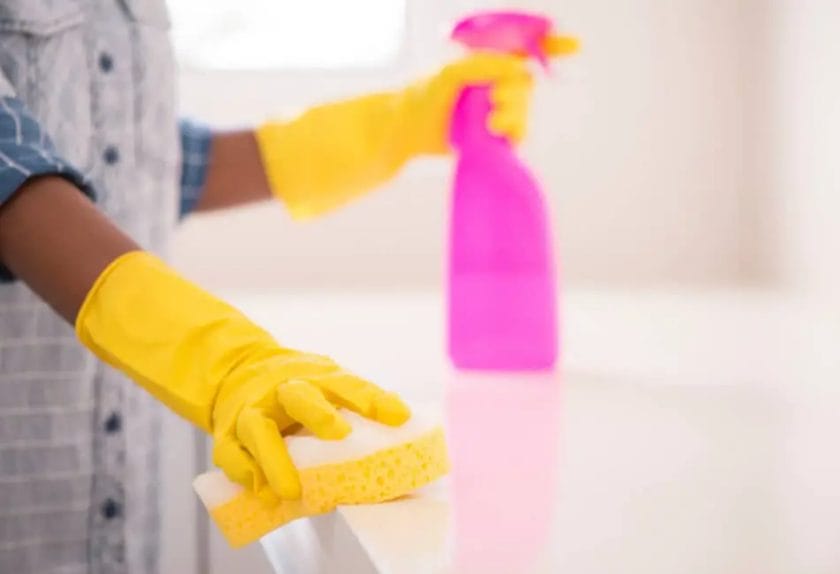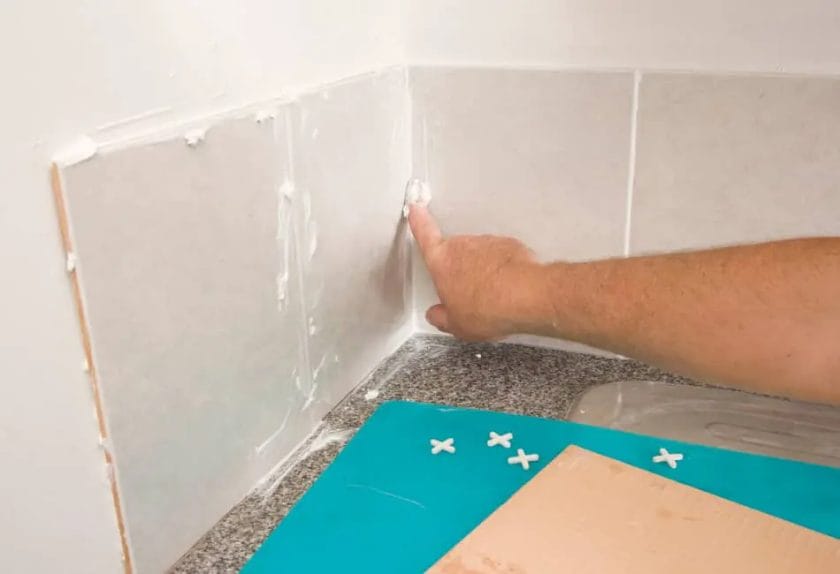Removing paint from quartz countertops can be a challenging task, but with the right techniques, it is possible to restore their original beauty.
One effective method is to use a gentle paint stripper specifically designed for use on quartz surfaces. Apply the stripper carefully, following the manufacturer’s instructions, and then gently scrape away the softened paint using a plastic scraper.
If the paint is stubborn, you can also try using a non-abrasive sponge or cloth soaked in rubbing alcohol or nail polish remover to soften and remove the paint.
Remember to test any product or method on a small, inconspicuous area of the countertop first to ensure it doesn’t cause any damage or discoloration.
After removing the paint, clean the countertop thoroughly with a mild soap and water solution to remove any residue, and then dry it completely.
With patience and the right approach, you can effectively remove paint from your quartz countertops, leaving them looking as good as new.

Step-by-step guide for removing paint stains on quartz countertops
Quartz countertops are a popular choice for kitchens and bathrooms due to their durability and aesthetic appeal. However, accidents happen, and you may find yourself dealing with a paint stain on your beautiful quartz countertop. Don’t worry, though, as there are effective methods to remove paint stains without causing any damage to the surface. In this section, we will provide you with a step-by-step guide on how to tackle paint stains on quartz countertops.
1. Act quickly
When you notice a paint stain on your quartz countertop, it’s important to act quickly to prevent the paint from drying and setting into the surface. The longer you wait, the more difficult it becomes to remove the stain.
2. Gather the necessary supplies
Before you start the paint stain removal process, make sure you have the following supplies on hand:
- Plastic scraper or putty knife
- Rubbing alcohol or paint thinner
- Clean, soft cloth
- Warm water
- Dish soap
3. Test on a small, inconspicuous area
Before applying any cleaning solution or method to the paint stain, it’s essential to test it on a small, inconspicuous area of your quartz countertop. This will help ensure that the cleaning solution won’t cause any discoloration or damage to the surface.
4. Scrape off excess paint
Using a plastic scraper or putty knife, gently scrape off any excess paint from the surface of the quartz countertop. Be careful not to scratch or gouge the countertop while doing this.
5. Apply rubbing alcohol or paint thinner
Moisten a clean, soft cloth with rubbing alcohol or paint thinner. Gently dab the cloth onto the paint stain, allowing the solution to penetrate and loosen the paint.
6. Blot the stain
After applying the rubbing alcohol or paint thinner, use a clean section of the cloth to blot the stain. Avoid rubbing or scrubbing vigorously, as this can damage the quartz surface. Instead, gently blot the stain until it starts to lift.
7. Clean with warm soapy water
Prepare a mixture of warm water and dish soap. Dip a clean cloth into the soapy water and gently clean the area where the paint stain was located. This will help remove any remaining paint residue and cleaning solution.
8. Rinse and dry
Rinse the area with clean water to remove any soap residue. Use a dry, soft cloth to thoroughly dry the quartz countertop. Ensure that there is no moisture left on the surface, as it can lead to water spots or streaks.
9. Repeat if necessary
If the paint stain persists after the first attempt, you may need to repeat the process. It’s essential to be patient and persistent when dealing with stubborn paint stains. However, if the stain still doesn’t come off, it’s recommended to seek professional help to avoid any potential damage to the quartz surface.
In summary, removing paint stains from quartz countertops requires quick action, the right supplies, and gentle cleaning techniques. By following this step-by-step guide, you can effectively remove paint stains and restore the beauty of your quartz countertop.

Recommended Products and Techniques for Paint Removal on Quartz Surfaces
Removing paint from quartz surfaces can be a challenging task, as quartz is a delicate material that requires special care to prevent any damage. However, with the right products and techniques, you can safely and effectively remove paint from quartz surfaces without causing any harm. In this section, we will discuss some recommended products and techniques that you can use for paint removal on quartz surfaces.
1. Isopropyl Alcohol
Isopropyl alcohol, also known as rubbing alcohol, is a versatile and effective product for removing paint from quartz surfaces. It is safe to use on quartz and does not cause any damage or discoloration. To use isopropyl alcohol for paint removal, simply dampen a cloth or sponge with the alcohol and gently rub the painted area in a circular motion. The paint should start to loosen and come off easily.
2. Paint Strippers
There are various paint strippers available in the market that are specifically formulated for removing paint from different surfaces, including quartz. When using a paint stripper, it is important to choose a product that is safe for quartz surfaces and follow the instructions carefully. Apply the paint stripper to the painted area and let it sit for the recommended time. Then, use a plastic scraper or a soft-bristle brush to gently remove the paint. Make sure to rinse the quartz surface thoroughly after paint removal to remove any residue.
3. Heat Gun
A heat gun can be an effective tool for removing paint from quartz surfaces. However, caution should be exercised when using this method as excessive heat can damage the quartz. To use a heat gun for paint removal, set it to a low heat setting and hold it a few inches away from the painted area. Gently heat the paint until it softens and starts to bubble. Then, use a plastic scraper to carefully scrape off the softened paint. Make sure to keep the heat gun moving to avoid concentrating heat on one spot for too long.
4. Soft-bristle Brush
A soft-bristle brush can be used in combination with other paint removal techniques to help loosen and remove paint from quartz surfaces. Apply a small amount of isopropyl alcohol or paint stripper to the painted area and use the soft-bristle brush to scrub gently in a circular motion. This will help to loosen the paint and make it easier to remove. After scrubbing, rinse the quartz surface thoroughly to remove any residue.
5. Commercial Quartz Cleaners
There are commercial quartz cleaners available that are specifically designed to clean and remove stains from quartz surfaces. These cleaners can also be effective in removing paint from quartz. Follow the instructions on the cleaner and apply it to the painted area. Let it sit for a few minutes and then gently scrub the paint with a soft cloth or sponge. Rinse the quartz surface thoroughly after paint removal.
Important Tips:
- Always test any product or technique on a small, inconspicuous area of the quartz surface before applying it to the entire painted area.
- Use gentle and non-abrasive materials to avoid scratching or damaging the quartz surface.
- Wear protective gloves and ensure proper ventilation when using chemical-based paint removers.
- If the paint does not come off easily or if you are unsure about how to proceed, it is recommended to seek professional assistance to avoid any potential damage to the quartz surface.
In summary, when it comes to removing paint from quartz surfaces, it is important to use the right products and techniques to ensure safe and effective paint removal without causing any damage. Isopropyl alcohol, paint strippers, heat guns, soft-bristle brushes, and commercial quartz cleaners are all recommended options for paint removal on quartz surfaces. Remember to take necessary precautions and test any product or technique on a small area before proceeding with the entire painted surface. If in doubt, seek professional help to ensure the best results.

4. Tips for preventing paint damage and maintaining the beauty of quartz countertops
Quartz countertops are a popular choice for kitchens and bathrooms due to their durability and beauty. However, it is important to take proper care of your quartz countertops to prevent paint damage and maintain their appearance. Here are some tips to help you protect your quartz countertops and keep them looking beautiful:
1. Use coasters and trivets: When placing hot pots, pans, or dishes on your quartz countertops, always use coasters or trivets to protect the surface. Direct heat can cause the quartz to expand and contract, leading to cracks or discoloration.
2. Clean spills immediately: Quartz countertops are resistant to stains, but it is still important to clean up spills as soon as possible to prevent any potential damage. Use a mild detergent and a soft cloth to wipe away spills and avoid using abrasive cleaners or scrub brushes that can scratch the surface.
3. Avoid abrasive materials: When cleaning your quartz countertops, avoid using abrasive materials such as steel wool or abrasive sponges. Instead, opt for a non-abrasive cleaner and a soft cloth or sponge to gently clean the surface.
4. Protect against scratches: While quartz countertops are scratch-resistant, it is still recommended to use cutting boards or chopping blocks when preparing food. Sharp objects such as knives can potentially leave scratches on the surface if not used with care.
5. Use trivets under paint cans: When painting near your quartz countertops, be sure to use trivets or protective mats under paint cans to prevent any accidental spills or drips that can damage the surface. Paint can be difficult to remove from quartz, so it’s best to take precautions.
6. Avoid harsh chemicals: When cleaning your quartz countertops, avoid using harsh chemicals such as bleach or ammonia-based cleaners. These can cause discoloration or damage the surface of the quartz. Stick to mild cleaners specifically designed for quartz surfaces.
7. Regularly seal the countertops: Although quartz countertops are low maintenance and do not require sealing like natural stone countertops, it is still a good idea to periodically apply a quartz countertop sealer to enhance their longevity and protect against potential damage.
8. Use cutting boards and trivets: To prevent any potential scratches or dents, always use cutting boards and trivets when placing sharp or hot objects on your quartz countertops. These simple additions can go a long way in maintaining the beauty of your countertops.
9. Avoid direct sunlight: Prolonged exposure to direct sunlight can cause fading or discoloration of your quartz countertops. To prevent this, consider using window treatments or placing objects on the countertops to block the sunlight during peak hours.
10. Regularly clean and maintain: Lastly, make sure to regularly clean and maintain your quartz countertops. Wipe down the surface with a soft cloth or sponge and a mild cleaner on a daily basis. This will help remove any dirt, debris, or stains and keep your countertops looking their best.
By following these tips, you can prevent paint damage and maintain the beauty of your quartz countertops for years to come. Remember to always handle your countertops with care and use proper cleaning and maintenance techniques to keep them looking their best. With proper care, your quartz countertops will continue to be a stunning centerpiece in your home.
Professional services for paint removal on quartz countertops: when to call in the experts
Quartz countertops are a popular choice for many homeowners due to their durability, beauty, and low maintenance requirements. However, accidents can happen, and if you find yourself with paint splatters or stains on your quartz countertops, you may be wondering if you should attempt to remove the paint yourself or call in the professionals.
While there are various DIY methods available for paint removal, such as using solvents or scraping with a razor blade, it’s important to consider the potential risks and challenges involved. Removing paint from quartz surfaces requires a delicate approach to avoid damaging the countertop’s finish.
Here are a few scenarios where calling professional services for paint removal on quartz countertops is highly recommended:
1. Extensive and stubborn paint stains
If you have tried multiple DIY methods and the paint stains on your quartz countertops persist, it may be time to call in the experts. Professional paint removal services have the knowledge, experience, and specialized tools to tackle even the most stubborn paint stains.
2. Large areas of paint coverage
If the paint has covered a significant portion of your quartz countertop surface, it is advisable to seek professional help. Removing paint from large areas can be time-consuming and labor-intensive. Professionals have the necessary equipment to efficiently and effectively remove paint from your countertops, saving you time and effort.
3. Fear of damaging the quartz surface
Quartz countertops are known for their durability, but they can still be susceptible to damage if not treated properly. DIY paint removal methods, such as using abrasive materials or chemicals, can potentially scratch or discolor the quartz surface. Professional paint removal services are skilled in handling quartz countertops and will ensure that the paint is removed safely without causing any harm to the surface.
4. Lack of time or expertise
If you simply do not have the time or expertise to dedicate to paint removal on your quartz countertops, it is best to leave the task to the professionals. Hiring a professional service will save you valuable time and ensure that the paint is removed correctly the first time, without the risk of causing further damage.
5. Peace of mind
By enlisting the help of professional paint removal services, you can have peace of mind knowing that your quartz countertops are in capable hands. Professionals will not only remove the paint but also take steps to restore the countertop’s original appearance, leaving it looking as good as new.
In summary, while there are DIY methods available for paint removal on quartz countertops, it is advisable to call in professional services in certain situations. Extensive and stubborn paint stains, large areas of paint coverage, fear of damaging the quartz surface, lack of time or expertise, and the desire for peace of mind are all valid reasons to seek professional help. By doing so, you can ensure that your quartz countertops are restored to their original beauty without any risk of damage.
FAQs
How can I remove paint from quartz countertops?
To remove paint from quartz countertops, start by scraping off any excess paint with a plastic scraper. Then, dampen a soft cloth or sponge with warm water and mild dish soap, and gently scrub the paint. If the paint persists, you can try using a non-abrasive cleaner or rubbing alcohol. Avoid using harsh chemicals or abrasive scrubbers, as they can damage the quartz surface.
Can I use bleach to clean quartz countertops?
No, it is not recommended to use bleach on quartz countertops. Bleach is a harsh chemical that can cause discoloration and damage to the quartz surface. Instead, it is best to use a mild soap or cleaner specifically formulated for quartz countertops. Always follow the manufacturer’s instructions for cleaning and maintenance.
How do I prevent stains on quartz countertops?
To prevent stains on quartz countertops, it is important to wipe up spills and messes promptly. Use a mild soap and warm water to clean the surface regularly. Avoid placing hot pans or pots directly on the quartz surface, as extreme heat can cause damage. Additionally, use cutting boards or trivets to protect the countertop from scratches and cuts.
Conclusion
In conclusion, removing paint from quartz countertops can be a challenging task. However, with the right techniques and products, it is possible to restore the natural beauty of your countertops. Remember to always take precautionary measures to protect the surface of your quartz countertops during the paint removal process. Whether you choose to use gentle household solvents, such as rubbing alcohol or acetone, or opt for a commercial paint remover specifically designed for quartz surfaces, follow the instructions carefully and test in an inconspicuous area first. By being patient, diligent, and using the right tools, you can successfully remove paint from your quartz countertops and achieve a pristine finish.
